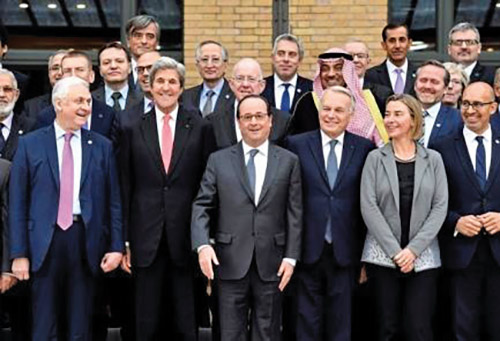

U.S. Secretary of State John Kerry eased Israeli suspicions Sunday in a phone conversation with Prime Minister Benjamin Netanyahu, in which he provided assurance that the Paris peace conference would not lead to any kind of concrete outcome at the U.N. Security Council or elsewhere.
Kerry promised Netanyahu that the United States would not assist in passing a resolution against Israel in Tuesday’s Security Council meeting, due to follow both the Paris conference and December’s passing of Resolution 2334 against the settlement enterprise.
According to a senior official in Jerusalem, Netanyahu told Kerry that Israel had already suffered damage due to U.S. refusal to veto the Security Council resolution in December.
At the same time, officials at the Prime Minister’s Office were glad to see the scaled-back concluding statement from the Paris peace conference, the restrained tone of which they attributed to Netanyahu’s diplomatic tactics, the National Security Council and Foreign Ministry officials.
The conference’s concluding statement notes that the participating countries “reaffirmed that a negotiated solution with two states, Israel and Palestine, living side by side in peace and security, is the only way to achieve enduring peace. They emphasized the importance for the parties to restate their commitment to this solution, to take urgent steps in order to reverse the current negative trends on the ground, including continued acts of violence and ongoing settlement activity, and to start meaningful direct negotiations.”
The statement said the 2002 Arab Peace Initiative is “a comprehensive framework for the resolution of the Arab-Israeli conflict, thus contributing to regional peace and security.”
It continued: “They [the participants] welcomed international efforts to advance Middle East peace, including the adoption of United Nations Security Council Resolution 2334 on Dec. 23, 2016, which clearly condemned settlement activity, incitement and all acts of violence and terror, and called on both sides to take steps to advance the two-state solution on the ground; the recommendations of the Quartet on July 1, 2016; and the United States’ secretary of state’s principles on the two-state solution on Dec. 28, 2016.”
Earlier, speaking at the opening of the weekly cabinet meeting Sunday morning, Netanyahu said, “The conference convening in Paris today is a useless conference. It is being coordinated between the French and the Palestinians. Its goal is to try to force terms on Israel that conflict with our national needs.
“Of course, it pushes peace further away because it hardens the Palestinian positions and it also pushes them away from direct negotiations without preconditions. I must say that this conference is among the last spasms of yesterday’s world. Tomorrow’s world will be different—and it is very near.”
Prior to the release of the concluding statement from the conference, French President Francois Hollande said that a two-state solution is the only way to bring about lasting peace and security in the Middle East.
“How can we expect stability in the Middle East without solving the oldest conflict in the region?” he asked.
Also at the conference, French Foreign Minister Jean-Marc Ayrault added that moving the U.S. Embassy from Tel Aviv to Jerusalem would have “extremely serious consequences,” going as far as to call the proposed move a “provocation.”
Britain, which had expressed reservations about the conference and its timing days prior to the inauguration of the new U.S. president, sent a relatively junior representative—Michael Howells, head of the Middle East desk at the Foreign Office—to the summit.
Meanwhile, hundreds of supporters of Israel protested the conference outside the Israeli Embassy in Paris. The protesters, arriving from Belgium, Germany and Holland, among other places, waved Israeli flags and expressed opposition to anti-Israel resolutions. Israeli Ambassador to France Aliza Bin-Noun was also at the protest, along with a representative from CRIF, the umbrella organization of Jewish communities in France.
Attorney Nati Rom, director of pro-settler organization Lev Haolam, said of the protest: “It is heartwarming to see more and more people working against these anti-Semitic resolutions and against the voices seeking to harm Israel.”
The Paris summit prompted a number of responses from representatives in Israel. Science, Technology and Space Minister Ofir Akunis (Likud) said, “Seventy countries gathered in Paris to support a Palestinian state. A hundred countries could have gathered there just the same. We will not give up or withdraw from our historical homeland—and we will not give it to the enemy so that it can establish another terrorist state.”
Knesset Foreign Affairs and Defense Committee Chairman Avi Dichter (Likud) said, “[U.S.] President-elect [Donald] Trump has a golden opportunity that leaders get only once, and that is to show himself, his country and the entire world that he really came to make changes.”
Deputy Foreign Minister Tzipi Hotovely (Likud) commented on Hollande’s speech, saying, “The comparison between terrorism and settlement-building is morally distorted. While Israel adds new life with the construction, Palestinian terrorism sanctifies the death of innocent people.”
At the same time, Zionist Union MK Nachman Shai said that “Israel has made a serious mistake. Boycott [of the summit] is not diplomacy; it is a childish huff. Israel must take advantage of every opportunity to advance an arrangement with the Palestinians that will help save us from the nightmare of one state for two peoples.”
Palestinian Authority representatives were pleased with the conference. PA President Mahmoud Abbas welcomed the concluding statement and said “the [participants in] the conference expressed in the concluding statement opposition to all of Israel’s dictates, settlement activity and establishing facts on the ground, including in Jerusalem.”
By Eli Leon, Shlomo Cesana, Gideon Allon and Daniel Siryoti/Israel Hayom













